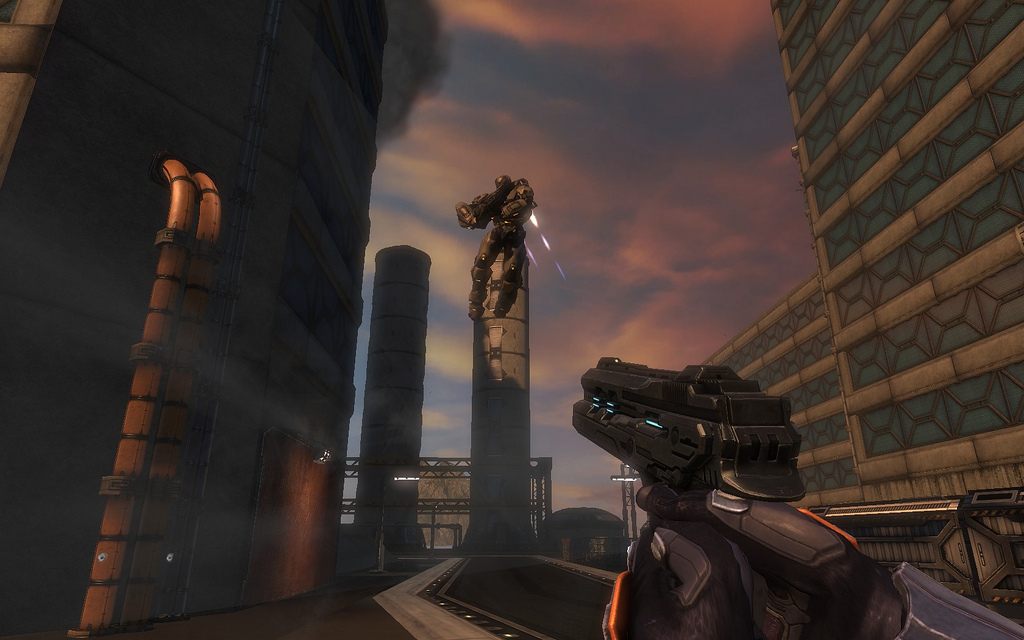TOM FRANCIS
REGRETS THIS ALREADY
Hello! I'm Tom. I'm a game designer, writer, and programmer on Gunpoint, Heat Signature, and Tactical Breach Wizards. Here's some more info on all the games I've worked on, here are the videos I make on YouTube, and here are two short stories I wrote for the Machine of Death collections.
Theme
By me. Uses Adaptive Images by Matt Wilcox.
Search

Section 8, District 9, Station 10
Is a sci-fi multiplayer shooter out this week, extremely like Battlefield 2142. Battlefield 2142 was awesome, and so is this. You literally dive into the battlefield from orbit, with no parachute, then pound each other with raucous guns and squabble over objectives.
I like it because you can design your own class in a powerful and elegant way, choose where to drop down and angle your descent, and the dynamic missions that pop up are clear, fun and varied.
Enemies get dynamic missions too, and in one round they were coming very close to capturing our intelligence. I’d died, so chose my custom Assault Sniper class, and picked their intel capture point to drop in on. I smacked into the ground just as the intel carrier reached the walkway leading to the capture point, and knelt there nailing him with sniper shots as he ran toward me until he buckled. It occured to me afterwards that I was the final boss in some AI dude’s epic quest to take our intelligence across this huge warzone. Sorry AI dude! Boss fights suck!
Aside: I got to see this game at an event in Texas once, and ran into the developers in the hotel the next morning, on my way out from breakfast. I asked them how they felt the presentation went, which is a stupid thing to ask developers because that’s exactly what they want to know from you. So they invited me to sit down and tell them.
Previously I knew them only as the guys responsible for a FEAR expansion so drab I openly mocked it on this site (sorry!). But after my oat bran French toast stuffed with maple banana cream-cheese with them, I was left with the impression that they were smart, fun guys who play all the games I play and have most of the same loves and gripes about them. I’m really pleased to see that actually comes out in their game.
Is a film released in the UK this week about aliens living alongside humans in Johannesburg. It’s unusual in that the aliens are powerless: only the workers survived their accidental arrival, and they don’t have the wit to stand up for themselves. It’s also unusual in that the protagonist is both dorky and unsympathetic. He’s a smiling bureaucrat who goes about his unpleasant task with equal parts relish, cruelty and incompetence.
The horrors that befall him, initially satisfying, soon become hard to watch, and the whole film threatens to become darker than its slightly flimsy premise warrants. Mercifully it stops short of that, and instead explodes in a giddy celebration of slapstick ultraguns and splattery comeuppance. The gritty unease of the first half sets off the geeky indulgence of the second satisfyingly, mixing moods and genres and smart and dumb in ways we rarely see, but should more often.
Aside: Mark Kermode said this week that all good sci-fi has to be a metaphor for something, make a point about reality. He’s an idiot. District 9 wilfully draws parallels to social rifts in Johannesburg, but like much good sci-fi, does it to add potency to its alien imagery, rather than say something about the source. You don’t need to replace black people with aliens for us to recognise cruelty and oppression.
Is Bletchley Park, which became known in wartime as Station X partly because it was the tenth wireless communications station established, and partly because if they went around calling it Bletchley Park people might realise it was in Bletchley.
It’s where the first programmable electronic computer was invented, not to crack the Enigma code but the Lorenz cipher, a much harder encryption that no-one seems to have heard of.
It’s also where the war was won, a good two years earlier than it otherwise might have been, thanks essentially to mathematicians there being better at maths than the Germans thought anyone possibly could be. The ability to read communications they assumed were undecipherable was such an enormous advantage that the Allies had to pretend they didn’t have it. They’d send scout planes to locations they already knew contained German fleets, just to give the Germans a feasible explanation for why they were about to be destroyed.
Kim and I went there last weekend. It’s falling apart. They can’t afford to maintain it, and no-one’s willing to help. Some thieves stole a German Enigma machine from there a while back, wrongly assuming that the site of one of Britain’s greatest contributions to humanity would have government money to pay the ransom. They couldn’t. The thieves gave up and posted the machine to Jeremy Paxman, who returned it with what we must assume was an expression of some bemusement.
Aside: This week the British Prime Minister Gordon Brown capitulated to an online petition by coder John Graham-Cumming for the government to apologise for sentencing the man primarily responsible for breaking the Enigma code to chemical castration for being homosexual. I don’t follow my own country’s politics closely enough to be conversant in the many reasons I should hate Gordon Brown, but the slimy, repulsive way he or his writers attempted to turn that apology into an excuse to boast, bafflingly claiming that he’s ‘pleased and proud’ to have to apologise for our country’s mutilation of its hero, is officially one.




